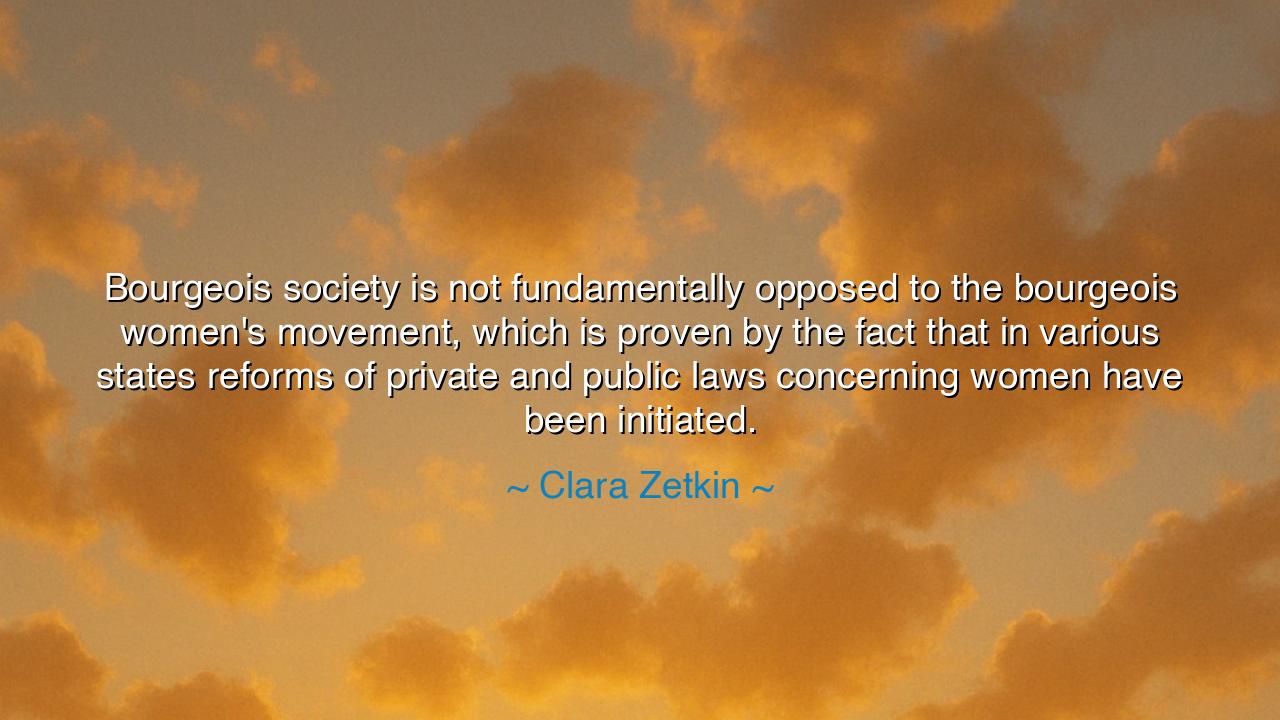
Bourgeois society is not fundamentally opposed to the bourgeois
Bourgeois society is not fundamentally opposed to the bourgeois women's movement, which is proven by the fact that in various states reforms of private and public laws concerning women have been initiated.






The words of Clara Zetkin, “Bourgeois society is not fundamentally opposed to the bourgeois women's movement, which is proven by the fact that in various states reforms of private and public laws concerning women have been initiated,” carry the voice of both a revolutionary and a prophet. Zetkin, a tireless fighter for women’s rights and a leader of the socialist movement in the late 19th and early 20th centuries, reminds us that struggles for justice are not monolithic. In her time, there was not only one women’s movement but many—some aligned with the bourgeois class, seeking reforms within the system, and others aligned with the working class, demanding a deeper transformation of society itself. Her words reveal the complexity of liberation: that even within structures of privilege, change may begin, though true emancipation requires more.
The origin of this statement lies in the debates between socialist and bourgeois feminists in Zetkin’s era. Bourgeois feminists sought reforms—such as the right to education, the right to vote, and legal recognition of women’s equality—within the framework of existing capitalist systems. Zetkin, while acknowledging the value of these reforms, pointed out that bourgeois society did not fundamentally resist them, because such changes did not threaten the heart of the system. The structures of capitalism and class domination could remain intact, even if laws concerning women advanced. To Zetkin, this was both progress and limitation: progress, because the chains of inequality were being loosened; limitation, because the roots of oppression were not yet being pulled from the ground.
History itself confirms Zetkin’s observation. Consider the granting of women’s suffrage in countries such as Britain and the United States in the early 20th century. These victories, born of courage and sacrifice by countless women—marching, fasting, enduring prison—were monumental. Yet they were tolerated by bourgeois society precisely because they did not overthrow the economic order. The mills, the factories, and the class hierarchies remained, even as women gained the ballot. Zetkin’s sharp insight was that reform could coexist with bourgeois structures, but that deeper liberation, especially for working-class women, demanded more than reform—it demanded transformation.
And yet, her words should not be heard as dismissal, but as wisdom. For Zetkin knew that every reform was also a step, and that steps, however small, could lead to greater change. The fact that bourgeois society initiated reforms in private and public law—allowing women to inherit property, to divorce more freely, to vote—meant that the edifice of patriarchy was not invincible. Once cracks appear in stone, they can be widened by the hammer of justice. Reform is not revolution, but reform prepares the ground for revolution.
The deeper meaning of Zetkin’s teaching is that liberation is many-layered. Some victories will be tolerated because they do not unsettle the entire order, while others will be resisted fiercely because they strike at the heart of oppression. Wise reformers understand this balance. They cherish reforms as stepping stones, but they do not mistake them for the destination. Zetkin’s life was a testimony to this dual vision: supporting women’s movements wherever they could achieve gains, yet always pointing toward the greater struggle against class domination and systemic inequality.
The lesson for us is enduring: do not despise the progress that seems small or partial, but also do not be lulled into thinking it is enough. When a society grants reforms, celebrate them—but recognize that such reforms often reveal the boundaries of what the system is willing to allow. Beyond those boundaries lies the harder path, where true equality must be seized, not merely granted. Zetkin calls us to see both the value and the limits of reform, and to keep our eyes fixed on the horizon of justice.
Practical actions flow naturally. Support reforms that expand rights and freedoms, for they matter deeply in the lives of real people. But also remain vigilant: ask who still benefits, who remains excluded, and what structures remain untouched. If you are part of movements for justice, do not fracture into bitterness between reformers and radicals; instead, see the work as complementary. Let the reforms prepare the soil, and let the revolutionary vision plant the deeper seeds. In this way, progress marches forward in both steps and leaps, building toward the day when freedom is not partial, but whole.
Thus let Clara Zetkin’s words echo as both recognition and challenge: bourgeois society may allow reforms, but true liberation lies beyond its comfort. Reforms are the cracks in the walls, but the wall itself must one day fall. And in the wisdom of her teaching, we learn this truth: celebrate progress, but never cease striving for transformation.






AAdministratorAdministrator
Welcome, honored guests. Please leave a comment, we will respond soon